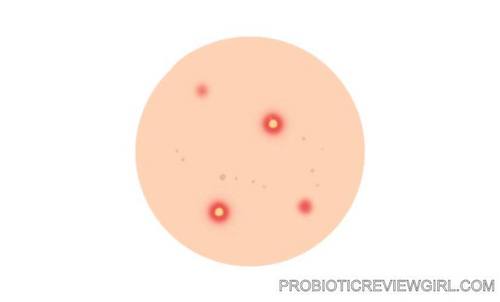Are Probiotics Good For Acne?
The general consensus among experts and scientific research is that probiotics may be good for acne treatment. Studies dating from the early 20th century have shown that the use of probiotics can help reduce skin eruptions and improve skin hydration.
Probiotics which are live micro-organisms, both when taken orally and applied topically, have been found to have antibacterial properties and can potentially decrease the severity and count of acne.
What Causes Acne?

Acne develops when hair follicles become blocked by a combination of sebum (oily substance) and dead skin cells. This blockage can lead to inflammation and infection, resulting in the formation of acne in not just teenagers but also adults.
Hormonal factors, such as an increase in androgen levels during puberty, contribute to the development of acne. Other factors that can contribute to acne include excess oil production, buildup of dead skin cells, growth of bacteria in the pores, and certain lifestyle factors like using too many skincare products, not washing off makeup, stress, and dietary choices.
Does Gut Health Cause Acne?
Gut health plays a role in many common skin disorders, including acne, eczema, and psoriasis according to a 2021 study authored by S Widhiati. The gut-skin axis explains how the gut can influence skin health and conditions such as gut dysbiosis, leaky gut, candida overgrowth, bacterial infections, and low stomach acid are mentioned as factors that can potentially influence the occurrence of acne.
The gut-skin axis refers to the bidirectional communication and interaction between the gut and skin, highlighting the influence of gut health on skin conditions such as acne.
A 2022 study authored by MR Mahmud, shows that an imbalance in the gut microbiome, such as small intestine bacterial overgrowth (SIBO) or dysbiosis, may lead to gut health issues and ultimately contribute to acne. The relationship between gut health and acne is still being studied, and further research is needed to establish a definitive connection on if gut health causes acne.
Is All Acne Caused By Bacteria?
Some Bacterial strains of Propionibacterium play a role in triggering the inflammatory response in acne according to J McLaughlin, but not all bacteria causes acne.
"Got Pimples? You May Need Better Bacteria published in Science.org showed that certain strains of the bacterium Propionibacterium acnes, commonly associated with acne, may cause acne, while another strain, RT6, appears to protect the skin and keep it healthy.
Why Is The Skin Microbiome Important?
The skin microbiome is important because it has it's own collection of microbes called the skin microbiome, and certain bacteria can trigger inflammation and acne.
The skin microbiome plays a crucial role in various aspects of skin health. It is composed of bacteria, fungi, and viruses that reside on the skin and interact with immune cells and skin cells according to a 2018 study authored by AL Byrd.
The skin microbiome is believed to contribute to barrier protection, aid immune defenses, and help fend off disease-causing microorganisms. It is considered a complex and dynamic ecosystem that influences the overall health of the skin according to a 2011 review authored by EA Grice.
What Probiotic Strains Are Good For Acne?
According to a 2015 study authored by MM Kober, the best probiotic strains for acne based on the amount of research include a combination of Lactobacillus and Bifidobacterium probiotics.
Among these strains, Lactobacillus acidophilus has shown promising results in improving inflammation and skin hydration and Bifidobacterium breve BR03 DSM 16604 for control of acne-prone skin.
Probiotic strains like Bifidobacterium lactis HN019, Bifidobacterium lactis Bi-07® and Lactobacillus acidophilus NCFM® have not been studied specifically for acne but may have digestive health benefits that help with acne.
How Do Probiotics Help With Acne?
Probiotics can help with Acne in 8 different ways. They can help reduce inflammation, oxidative stress, rebalance gut dysbiosis, inhibit pathogenic bacteria on the skin and maintain gut barrier integrity. They can also promote gut health, regulate bowel movements, and help manage the effects of stress, which can contribute to acne according to a 2019 by YB Lee.
Can Probiotics Make Acne Worse Before It Gets Better?
Probiotics may potentially cause acne breakouts in some cases before getting better. Introducing probiotics into your digestive system may initially stir things up and potentially increase the number of breakouts.
The effects of probiotics on acne can vary, and some argue that probiotics can help improve acne while others suggest they may worsen it. There is a need for further research and consideration of individual responses to probiotics in relation to probiotics making acne worse.
Do Topical Probiotics Help Acne?
Topical probiotics applied directly to the skin may prevent the growth of harmful bacteria and reduce acne lesions according to a 2022 review authored by M Habeebuddin. The study showed that topical probiotics have demonstrated beneficial effects in the treatment of certain inflammatory skin diseases such as acne, psoriasis and rosacea.
Topical probiotics refer to the application of beneficial microorganisms, such as bacteria or yeast, directly onto the skin to promote skin health and treat various skin conditions.
Does Kimchi Help With Acne?
Lactobacillus plantarum CJLP55 is a probiotic strain isolated from Kimchi a fermented probiotic food that may help with acne.
A 2021 study authored by MJ Kim, found that the dietary supplementation of Lactobacillus plantarum CJLP55 improved acne lesion count and grade, reduced sebum triglycerides, increased skin hydration and ceramide 2 levels.
It influenced the composition of urinary bacterial extracellular vesicles, indicating potential positive effects on the skin condition and systemic bacterial flora in patients with acne vulgaris.
Dr. Sara Mesilhy has a Master’s degree in Gastroenterology and holds a membership with the Royal College of Physicians of the United Kingdom. She completed her Bachelor of Medicine, Bachelor of Surgery (MBBS) at Cairo University and is currently part of the ProbioticReviewGirl medical team.